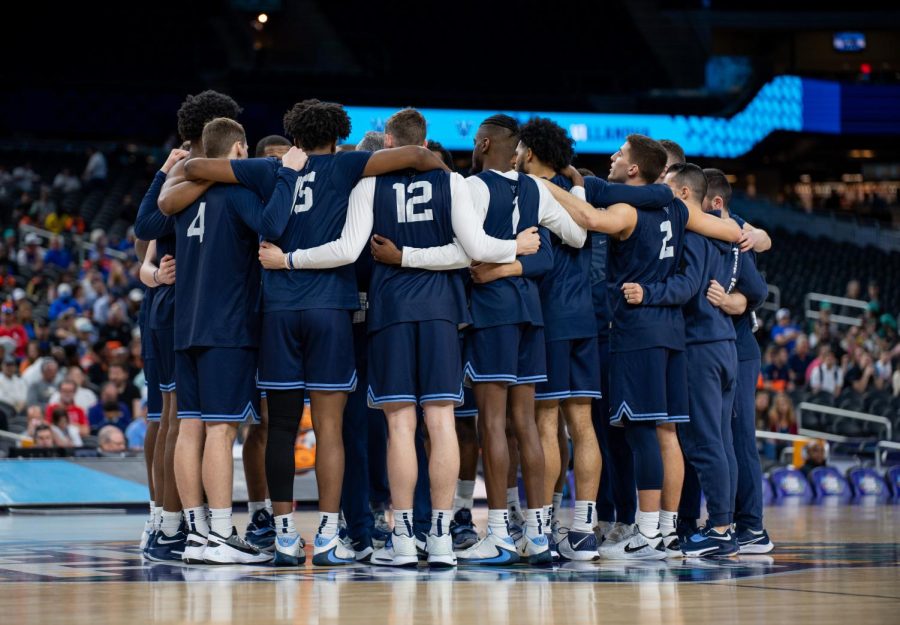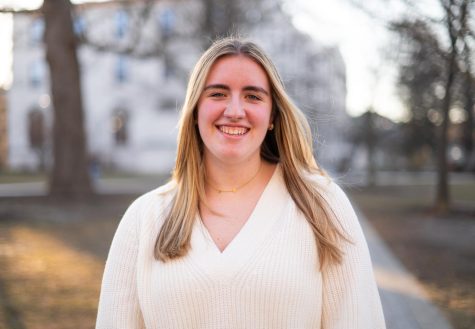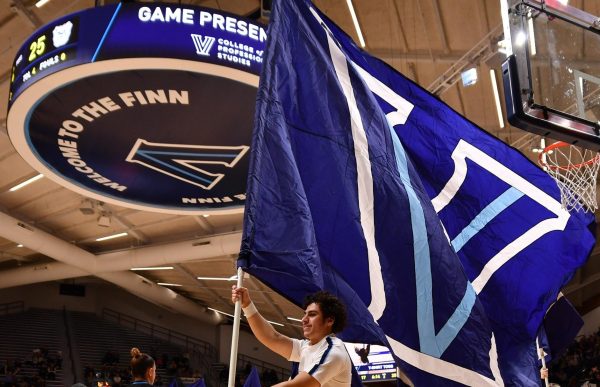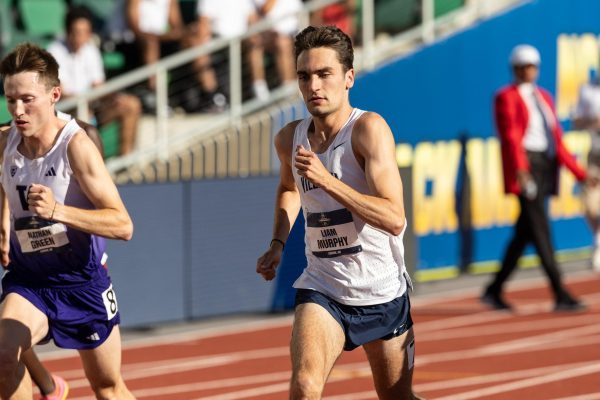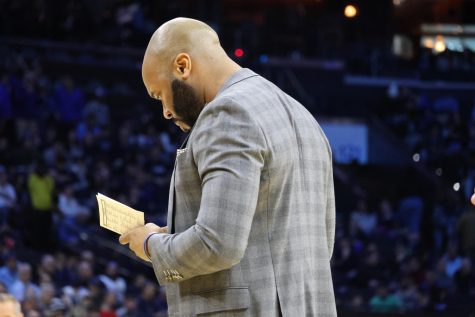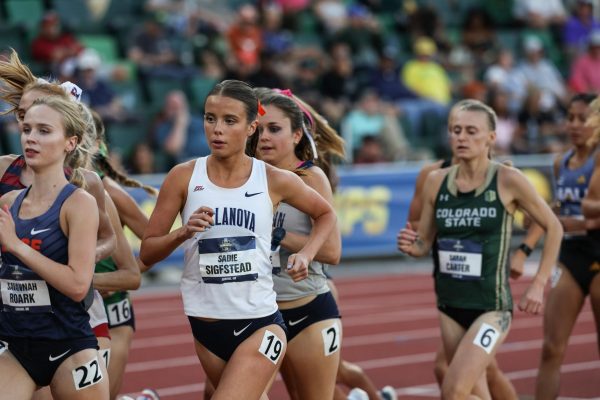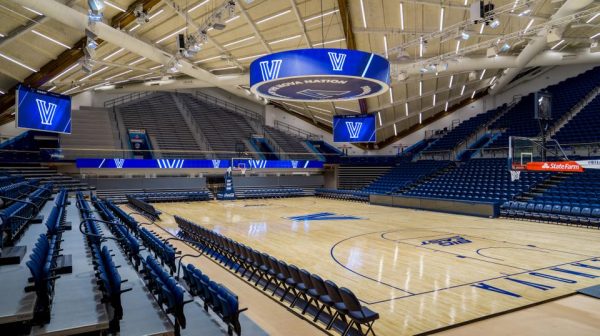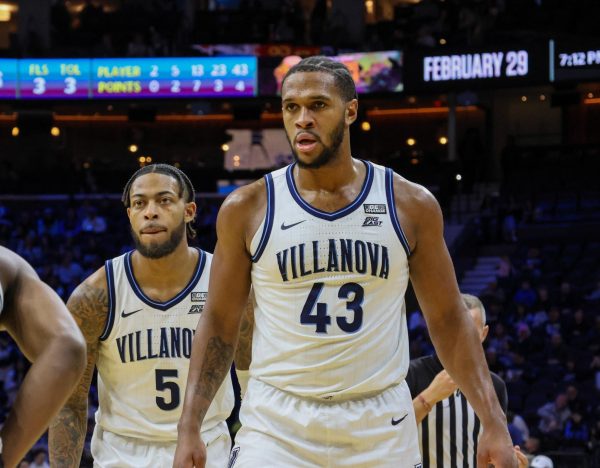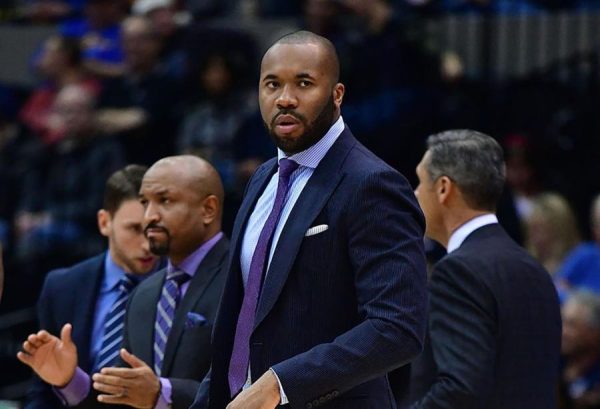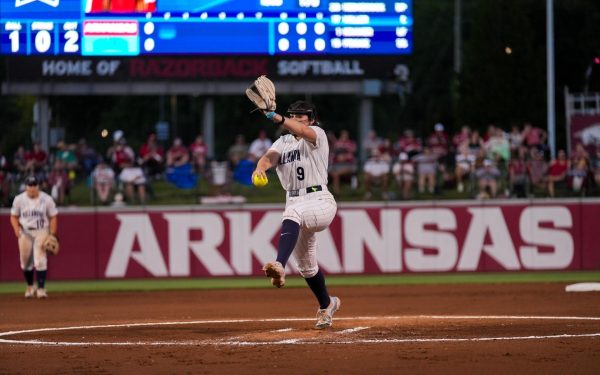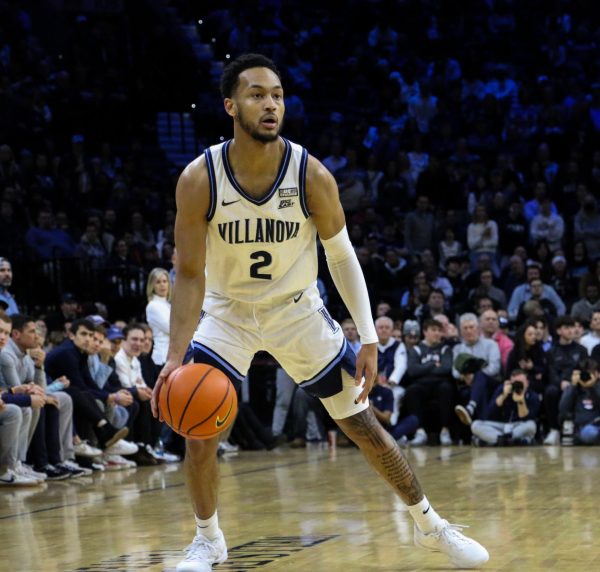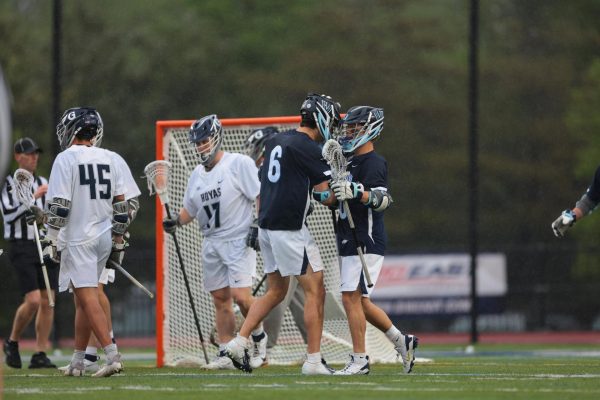Attitude: Inside the Mantra That Got ‘Nova to New Orleans
Olivia Pasquale/Villanovan Photography
The team’s huddles may be the clearest picture of Villanova’s ‘Attitude’.
April 2, 2022
NEW ORLEANS— On Apr. 4, 2016, with 4.7 seconds left on the clock, North Carolina’s Marcus Paige hit a three that many thought would go down as one of the most clutch shots in March Madness history. A shot to tie the National Championship game. A shot that should cause the opposing team to panic. But in this game, on the other end of the floor, it was not just any team. It was Jay Wright’s Wildcats, a group that never panicked.
No one was frustrated. No one sulked. No one lost faith.
They called timeout, walked back to the bench, and clapped it off, an action that current Villanova forward Eric Dixon calls “clapping into Attitude.”
“I just remember Arch (Ryan Arcidiacono) being one of the best guys and just staying focused and keeping everybody else locked in to the next play,” Villanova assistant coach Mike Nardi recalled of the moment. “I mean, just those guys as a group, they all just came back and said ‘Attitude.’ It was like it didn’t phase them and we try to practice that everyday so that we’re prepared for the most difficult situations.”
What happened next? Arguably the most clutch shot in NCAA History, a Kris Jenkins three on a perfectly designed full court play to win Villanova’s first National Championship of the Wright era.
Many look at the talent that the team had, with nine eventual NBA players on the roster, but without the Villanova culture that Wright fosters in each of his teams, the group may not have had the resilience to overcome the blow of Paige’s shot.
This culture did not start in 2016, and it certainly didn’t stop there either. From his first season in 2001, Wright has spent the last two decades building this foundation for a culture that is now known as one of the best in the country. He fosters a family-like environment by hand picking players willing to buy in and coaches who will add to it. Nardi and fellow assistant coach Dwyane Anderson both played under Wright before joining the coaching staff and now use their experiences to carry on the tradition of “Villanova Basketball.”
“I just think our guys know that myself and Dwayne have played for Coach (Wright) and been through that as players and then obviously now as coaches,” Nardi said. “So I just think it means a lot, it has credibility, and I think our guys are intelligent and they really buy into that.”
At the core of this culture is the “Attitude” that Dixon and Nardi mentioned. It is something that Wright has preached, even writing a book about it in 2017. But it’s not just a slogan for the Wildcats, it is a way of life.
“It’s something that we want our guys to learn about for life and we want to learn on the basketball court,” Wright said when asked what “Attitude” means to him. “The basic concept is that in life we don’t have control of what happens to us. But we have control of how we respond to whatever happens to us and we have a choice each day. Whatever is going on, what is our attitude going to be?”
Before his players ever put on a Wildcat jersey, Wright is clear about the expectations placed on a Villanova basketball player and what it means to be a member of the program. When asked about when he first heard about “Attitude”, senior Brandon Slater laughed, saying “That’s before you get here. Coach Wright talks about that when he’s recruiting you, like the first conversation you have.”
Wright and his staff ensure that every athlete that they bring aboard will buy in 100% to the Villanova culture, and once they arrive on the Main Line, the focus never shifts.
“We’ve got ‘Attitude’ bracelets, ‘Humble and Hungry’ bracelets, ‘Once a Wildcat, Always a Wildcat’ bracelets,” Slater explained. “We’re always talking about family, we always talk about attitude. “Attitude” is amazing. We have ‘Attitude’ on our practice doors, ‘Attitude’ on our shirts and shoes. ‘Attitude’ is everywhere.”
This philosophy extends to life off the court as well. Wright and his staff know that the athlete’s time at Villanova is not just about their success in games, but rather their growth as a student and a person.
“Even apart from basketball, it’s more important in life that they learn that here so that when they are husbands and fathers and they go through those situations, losing a job, whatever it may be,” Nardi said. “There’s just things you can’t control. But if you’re put in that situation, can we have a positive impact and kind of think like that, just mental toughness to move past it, learn from it and get better.”
While “Attitude” is the focal point of the culture, it is not the only thing that makes Wright’s teams so successful. The communication amongst the players, both verbal and nonverbal, is constant and contagious, keeping the team together through everything they do. Whether it be high fives and fist bumps or calling each other’s name and counting out shots in practice, everyone is locked in and participating.
From top to bottom, all the way up to Wright and down to the equipment managers, everyone feels valued. The mutual respect breeds a brotherhood mentality, not only within the program, but one that extends to the players’ families.
There’s no better example of this than the moment shared between redshirt senior Caleb Daniels’ parents and the entire Villanova team following the Wildcats’ open practice on Saturday morning in New Orleans. His teammates and coaches know how special this weekend is for Daniels, who grew up and started his college career in New Orleans, and they acknowledged this by greeting his parents with hugs as they departed the court.
“Oh, that made me feel so special, I feel like they’re my sons as well,” Daniels’ mother, Connie Daniels said following the moment. “Like Caleb, he’s said it’s a pure brotherhood and for the coaches that do it as well, it’s like they’re happy to be here and know that we’ve traveled so far to come up to Philly to see them play. Just for them to take the time out of their busy schedule to do that, it was really awesome.”
The love that the players share is felt by their families and carries them through obstacles like injuries. When starting guard, junior Justin Moore, went down with a torn achilles last weekend in San Antonio, everyone started to doubt the Wildcats’ ability to finish their championship run. Well, everyone but them.
“I called Collin Gillespie and said, ‘Do I need to talk to these guys about being ready, believing we can do this without Justin?’” Wright said. “He’s like, ‘No way. Everybody is good. Don’t worry about it.’ So I never had to approach it, because we talk about it all year, when anybody is out… I think they believe in each other.”
This unwavering belief throughout the program extends to alumni who continue to carry on the Villanova legacy after graduation. Wright’s upperclassmen tend to take on a mentor role and this doesn’t stop when they hang up their jerseys. The alumni show support for the current players throughout their season and it is clear that the lessons and values that they learned during their time at Villanova stick with them.
“They all preached the same thing,” Slater said of the alumni he spoke to ahead of the Final Four. “It is like 10 Coach Wrights texting me. All those guys still believe the same thing.”
Long lasting impact is the sign of a strong culture and it seems as though this is exactly what Wright has built at Villanova. As the group approaches its Final Four matchup against Kansas on Saturday, staying and playing together is more important than ever. Rallying around an injured Moore, the Wildcats only have to win one more game to give themselves a chance to repeat history and win their fourth title on Monday, Apr. 4, the six-year anniversary of the Jenkins shot.
“It was that team (2016), then it was ‘17, and then ‘18, and those guys have all been part of tradition,” Nardi said. “That’s just kind of what we’re trying to do. And does it always work out in your favor? No, you know, but at least you give yourself a chance when you do get put in that situation. To have a chance to win.”

